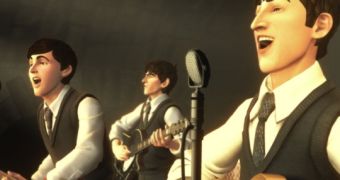The Beatles: Rock Band – Two Microphone Pack release for the PlayStation 3 was announced today by MTV Games, Harmonix game developer and distribution partner Electronic Arts Inc. The game will facilitate two SingStar microphones from Sony and promises to create a unique interactive singing experience that will reshape the rhythm game genre feeling. The Beatles: Rock Band – Two Microphone Pack for PS3™ comes with a catalog composed of 45 available tracks and is available now in the UK for a suggested price of £49.99.
The game will allow for additional downloadable content provided via the Beatles: Rock Band Music Store. Abbey Road will be released on October 20, 2009, followed by the release of Sgt. Pepper’s Lonely Hearts Club Band in November and Rubber Soul in December. The game received a PEGI rating of 12, in line with the rest of the Beatles: Rock Band.
The success of the rhythm games comes almost solely from the specific controllers, designed to replicate musical instruments. These simplified versions of the genuine instruments allow the players to perform famous songs made available by the software. But with the microphone the story is a little bit different. The instrument remains the same as the one used by the professional artist and no simplification is made. The microphone isn't the problem here, since honestly it's not the one that generates the sounds. The player’s voice acts as the instrument and the microphone is just a medium. The introduction of the microphone can't bring a genuine feeling of performing something of actual quality any more than a karaoke session.
But the ultimate purpose of games is to amuse the players and the controller might just turn out to be fun. Not everyone has a voice that can hold a note or sing an entire song so the perfect instrumental played back by the speakers of your gaming system might not be accompanied by the same quality of vocal performance. Groans and squeaks would be more accurate to describe the actual singing, but that will most likely be replaced by the laughs and giggles of the surrounding “band.”

 14 DAY TRIAL //
14 DAY TRIAL //